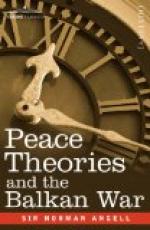greater degree where force “settles” the
matters in dispute, where the bullet replaces
the ballot, and where bayonets are resorted to
instead of brains. For Devonshire is better than
Nicaragua. Really it is. And it would
get us out of none of our troubles for one group
to impose its views simply by preponderant physical
force, for Mr. Asquith, for instance, in the true Castro
or Zuyala manner, to announce that henceforth
all critics of the Insurance Act are to be shot,
and that the present Cabinet will hold office
as long as it can depend upon the support of the Army.
For, even if the country rose in rebellion, and
fought it out and won, the successful party would
(if they also believed in force) do exactly the
same thing to their opponents; and so it would
go on never-endingly (as it has gone on during
weary centuries throughout the larger part of
South America), until the two parties came once more
to their senses, and agreed not to use force when they
happened to be able to do so; which is our present
condition. But it is the condition of England
merely because the English, as a whole, have
ceased to believe in Mr. Chesterton’s principles;
it is not yet the condition of Venezuela because
the Venezuelans have not yet ceased to believe
those principles, though even they are beginning
to.
Mr. Chesterton says: “Men do judge, and always will judge, by the ultimate test of how they fight.” The pirate who gives his blood has a better right, therefore, to the ship than the merchant (who may be a usurer!) who only gives his money. Well, that is the view which was all but universal well into the period of what, for want of a better word, we call civilisation. Not only was it the basis of all such institutions as the ordeal and duel; not only did it justify (and in the opinion of some still justifies) the wars of religion and the use of force in religious matters generally; not only was it the accepted national polity of such communities as the Vikings, the Barbary States, and the Red Indians; but it is still, unfortunately, the polity of certain European states. But the idea is a survival and—and this is the important point—an admission of failure to understand where right lies: to “fight it out” is the remedy of the boy who for the life of him cannot see who is right and who is wrong.
At ten years of age we are all quite sure that piracy is a finer calling than trade, and the pirate a finer fellow than the Shylock who owns the ship—which, indeed, he may well be. But as we grow up (which some of the best of us never do) we realise that piracy is not the best way to establish the ownership of cargoes, any more than the ordeal is the way to settle cases at law, or the rack of proving a dogma, or the Spanish American method the way to settle differences between Liberals and Conservatives.
And just as civil adjustments are made most efficiently, as they are in England (say),




